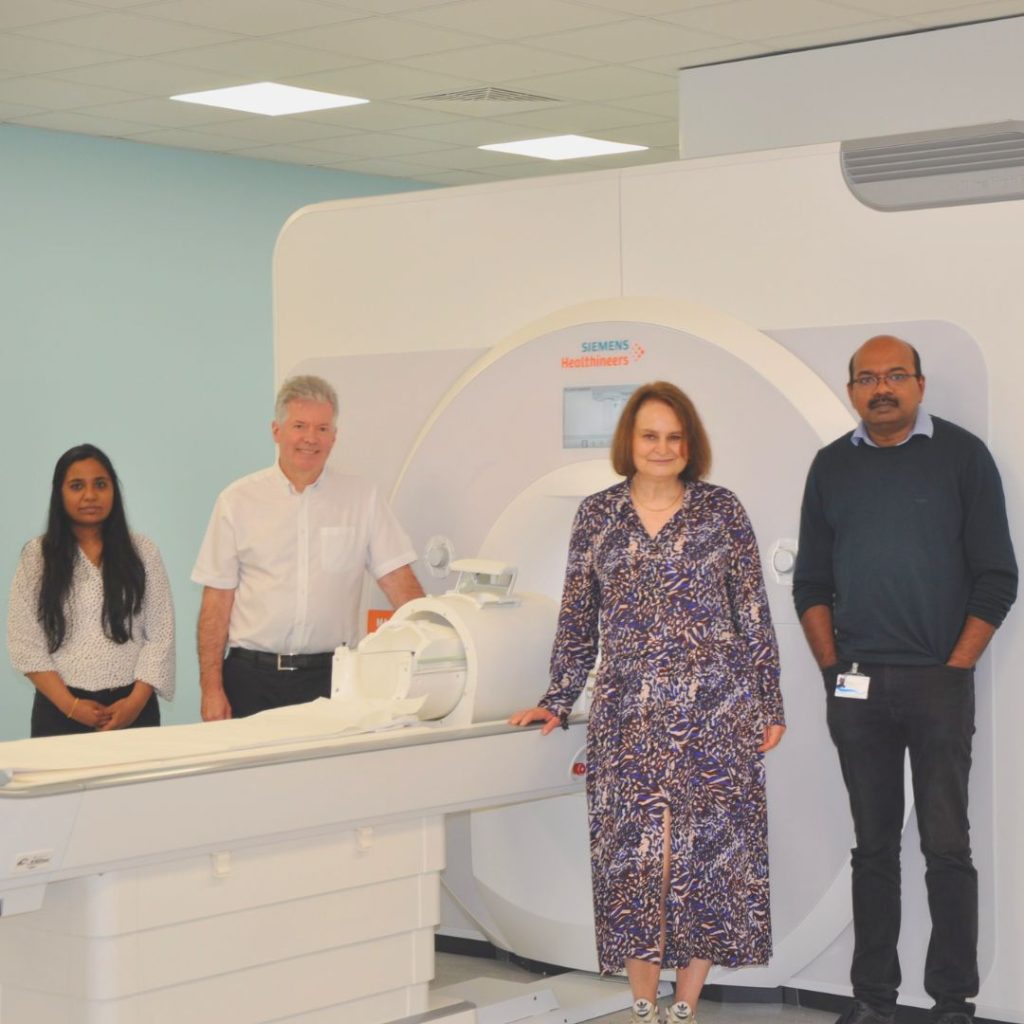What is MND
Find support
I have MND
I am supporting someone
Get involved
Research
About MND Scotland
What’s new?
© MND Scotland 2026
© MND Scotland 2026

MND Scotland are investing £10,000, and working with the Neurosciences Foundation, to support an innovative study into the potential use of MRI scanning for diagnosis and monitoring of motor neuron disease (MND).
Based at the Queen Elizabeth University Hospital, Glasgow, Professor Natasha Fullerton, Professor David Porter and Dr George Gorrie will use an advanced MRI scanner, and newly developed radiofrequency (RF) coil, to identify patterns of biomarkers (a molecule that can be measured to indicate or track disease) in the brains of people with MND in order to provide a new way of diagnosing the condition.
Currently, there is no definitive test for MND and diagnosis is a lengthy process in which other conditions are eliminated. In addition, the tests which people must undergo in this process are invasive and can be painful. With the possibility of new, disease modifying treatments becoming available in the future, it is more important than ever to have an accurate early diagnosis, since this should lead to early treatment.
In this project, the research team will be using a 7-tesla (7T) MRI machine to test a new RF coil designed to improve image quality and allow the identification of non-invasive biomarkers that may correlate with clinical and genetic MND subtypes.
7T MRI is more sensitive and provides a higher resolution image than the 1.5T and 3T machines currently in use in most hospitals. This more powerful machine can differentiate between body tissues more effectively and provide better contrast between grey and white matter in the brain. The 7T MRI scanner also makes it easier for the researchers to look at mineral and metabolite levels in the motor cortex of people with MND. Currently, there are five 7T MRI machines in the UK, and only one in Scotland owned by the University of Glasgow.
This study will focus on the potential use of combining a newly developed RF coil (developed in Glasgow by Dr Shajan Gunamony with funding from the Neurosciences Foundation) with the 7T MRI machine. This coil uses a parallel transmission system with multiple “antennas”, which improves the uniformity of the MRI image, allowing high-quality images to be acquired in all parts of the brain. This will allow accurate visualisation of the brainstem and upper spinal cord at the same time, which is hard to achieve without this new coil. This is an important feature for MND research, as it will allow the project to investigate both cortical and brainstem regions.
The overall aim of the study is to find a way to identify new metabolite biomarkers for MND using the 7T MRI machine and innovative coil. The hope is that these biomarkers can be correlated with specific subtypes of MND and open up the doors for early diagnosis of disease and monitoring of treatment effectiveness.
The research team will conduct scans of 15 patients with MND. The hope is that this will enable the development and optimisation a protocol that will be able to identify different levels of metabolic and mineral biomarkers, above and beyond those that can be identified using a standard coil.
Professor Natasha Fullerton said “We are delighted to receive this funding for MND research; and are excited to be part of a larger community contributing to research, that could help in the diagnosis of patients living with motor neuron disease. The funding will enable us to work on novel imaging techniques, that build on imaging innovations, resources and expertise available in Scotland. We hope this will lead to a more efficient, precise, and personalised diagnostic pathways for patients living with motor neuron disease across the UK.”

Director of Research for MND Scotland, Dr Jane Haley said “Timely and accurate diagnosis of MND is really important for people and will become even more urgent once meaningful treatments are available. We are pleased to be working alongside the Neurosciences Foundation to support this project exploring whether new technology combined with high resolution brain MRI could provide a way forward.”
If this project achieves its aims, it opens the door for further work that may lead to not only earlier diagnosis, but identifying specific sub-types of MND and measuring response to treatment which may help
The Glasgow researchers would like to invite people affected by MND to join a Patient and Public Involvement group (PPI) to provide input into the project. This will include activities such as reading over materials intended for the research participants to ensure they are understandable. If you would like to get involved, please email involvement@mndscotland.org.uk.
Sign up
for newsletter
Get the latest news and events straight to your inbox.
You can help create a world without MND